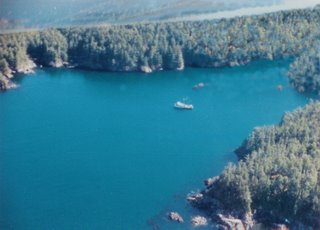Confused about RSDAs? Vol. I

"We told them that could not be done, because fisheries groups do not get along that well. Fisheries(DFO) responded by saying that would force them to close ground fishing altogether while they came up with a plan, says Mose, and that motivated the fishermen to find a compromise."
I took this picture of my black cod tender in Squid Bay when I was running a plant in Juneau. A half hour after I took this picture, Ole Nelson was telling me about how he saw my father's brother perish when his warplane crashed in Gastineau Channel during WWII.
This is a snippet from an article from B.C. on rockfish catch reporting, but it may as well be from Alaska, and it points out a problem that stands in the way of all good fisheries initiatives in the State. Fishermen in one family don't work together (been there, done that), much less work together within their gear group or with other gear groups. But, as Sen. Lisa Murkowski said, the main benefit of the Regional Seafood Development Organizations is that they will get fishermen to work together.
How true that is. That's why I started working on this concept 15 years ago; wrote the first White Paper, saw it used (and abused) to write the first Bill to allow for it's funding, promoted it at great expense to myself over the years, and only saw more reason for it to go forward all the time. Media reports lately have quoted a naysayer or two. These kind of guys complain that the water is too calm, driving the fish down, and complain when it's too choppy because it jerks the fish loose from the gillnet. They complain about most everything, except people that don't work together for a common good.
Hunting and gathering kinda makes you this way. Not that it's any kind of good excuse. To be successful at fishing you have to have this grim determination that is not all that compatible with being an astute businessman. That's why fishermen have left the business end up the the processors all this time.
The problem now, is that processors are consolidating faster and faster. There used to be ten times the number of packing plants operating as there are now. This consolidation costs them money, money that could be used to pay fishermen more. Yachts and jets and ranches are being purchased with money that could be used to pay the fishermen more. Profits are sent overseas in abusive transfer pricing schemes to dodge taxes and show low profits to justify paying the fishermen less.
But if fishermen don't have a business association to look out for their business interests, they fall prey to all kinds of schemes to let them just eek out a living and even thin out their ranks. Until the RSDAs came along, there were very few business associations. There had been some, like the Southeast Gillnetters Co-op that ran their fish to Seattle for processing. But the many dozens of fishermen's groups in Alaska are trade associations that focus on allocation issues almost exclusively.
Some groups like UFA, claim to represent many of these trade associations, but don't get involved in the nuts and bolts of helping find solutions to business problems. (That group is controlled by a small group of S.E. limit seiners who worked to lock fishermen into selling to specific processors, and further, to thin out their ranks by various means. Neither are good business strategies for fishermen in a region as is obvious.)
I've been a fan of the RSDA concept since our bank (CFAB) brought a past Executive Director of Florida Citrus Mutual to Anchorage to speak on their experience with the concept in Florida. Of course they got hip to the idea over 70 years ago now. The orange growers had the same problems the Alaska fishermen have; processors who won't improve on processing technology, and marketing strategies that weren't putting more money in their pockets. They got State backing, formed an Association, and developed the technology and marketing to send oranges all over the place at a tidy profit. (The almond growers did this too, and their almond meat prices jumped from 3 cents a pound to 37 cents a pound.)
So, why would a gillnetter in Southeast Alaska say "he doesn't think it will work," or "I don't see how my money is going to help raise fish prices"? Just lack of knowledge. I've heard one past S.E. Gillnetters president say he doesn't think fishermen have computers. Well, we know many do, but many don't either, and that's where the naysayers come from. Thank God it's only going to take a few smart fishermen to get the ball rolling.
RSDAs will get going sooner or later. Hopefully it will be sooner. Later will mean much fewer boats, and maybe the total absence of the gillnet fleet in Southeast. The state sanctioned RSDA for S.E. has an office in Wrangell at the moment. It could be moved anywhere, it could be a moving office, or even operate from an Earth orbiter. The gentleman from Florida said the whole thing is about control. This is not a word for the timid, considering that's the last thing the processors want to hear.
But fishermen need their own organization, run by themselves, to represent their business interests and even the processors acknowledge that. Processors may not like it, but they acknowledge the fact. So fishermen should too, then get together and RUN THEIR OWN SHOW, and if they need help, they should get over their shyness and ask the teacher for help.


<< Home